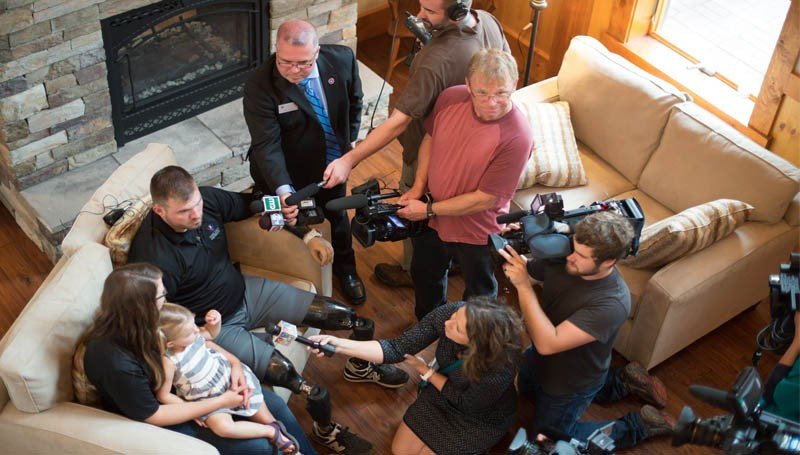Be the Reporter! How to Secure Your Message…
I am not a reporter. I am a Public Relations professional! However, the below tricks of the trade I’m going to unveil will allow you to more effectively control your organizations’ message when being interviewed by a television station.
After conducting hundreds of interviews as both the subject of the interview, as well as the orchestrator of media events across the country, I’m always amazed as to how the art of TV reporting has changed industry-wide. As newsrooms have tighter budgets, the ability of the media to accurately cover news has shrunk. Unless it’s a huge news story, it is rare for a television station to send a reporter and a photographer to cover an event. Usually, you’ll get one multimedia journalists who covers the story as a journalist, but also is expected to be the videographer at the same time. This means they are handling 2 jobs.
Most Important: Provide your story to the media on a silver platter!
Press Release or Media Advisory: Make the press release to the point and don’t fill with fluff. Most of the time, the stations won’t use it but the social media person may. If the social media person uploads the story incorrectly or there is information you’d like to have placed online, you can usually call the station and ask for their social media person and they, most of the time, will make the corrections you requested.
List Names: Making the job easy for the reporter includes having a list of names of all the speakers spelled correctly. Having a picture of that person along with his or her name is even better for accuracy. I don’t always suggest this but, if you also provide cell phone numbers of the speakers, the reporter can call them directly if they have any questions.
Provide B-Roll Video: When I produce events with heavy video content, I try to personally produce b-roll video the day before the media event. Therefore, at the media event I can provide incredible footage of the message I want to get out. By provided that video to the media on a flash drive, it’s more likely they will use some of it in their post-production of the story. This insures a full and complete reporting on the story, especially if the videographer forgets to video something.
Jump in and BE THE REPORTER: When one or more media outlets are interviewing someone at a time, offer to hold the microphone for those reporters. This allows you to control the message! Most of the time, the reporter doesn’t have all the correct information about the person or event – OR, they have to sum it all up within only an hours timeframe. My strongest advice to PR and non-PR people is to allow the reporter to ask all their questions while remaining silent. After the reporter is finished asking his or her questions AND only if the reporter doesn’t ask the questions that you want asked, offer to ask a few questions yourself! In almost all cases of me phrasing the questions my way, the interviewee answers the questions in a sound byte fashion that is used on-air. Obviously, you have to be keen to asking the right questions. But, this allows for your message to be told effectively.
Follow-up: Always be accessible and attentive to media after the initial interviews or events. At dozens of media events I’ve planned over the years, I find that in about 75{fb2cd6ecc5ea822e7d55867f94952838aab4b89ae39846a722113040866900c7} of those events, the reporter or a producer will call me later with questions specific to details of what was covered. Response time is important because they are on deadline to get the story out.
Stay in Contact: Yes, stay in contact with the reporter, videographer or producer because you never know when you may need to reach out to that person again. Earning media coverage is a skill and if done right, you may have many more opportunities down the road to tell your story again!
Don’t Get Mad: Often, I hear people say, “I don’t like the media because they don’t tell the story right.” Keep in mind that reporters are under deadlines. Reporters are human. And, reporters cover multiple stories each day, 5 days a week. If it’s a busy news cycle, sometimes those reporters can be working 7 days a week and 12-hour days. Therefore, you cannot take it personally when something doesn’t get covered in the way you think it should. You roll the dice and the more stories you work on, the odds are in your favor that they’ll get the majority of the stories right, especially if you hand the story to them on a silver platter!
The above suggestions are based upon my 20 years of experience in working with the media and planning high-profile media events across the country. I am always amazed at how people interact with the media. Be the reporter! And, if you want to hire an expert, call Chemistry Multimedia at 314-603-2866!









